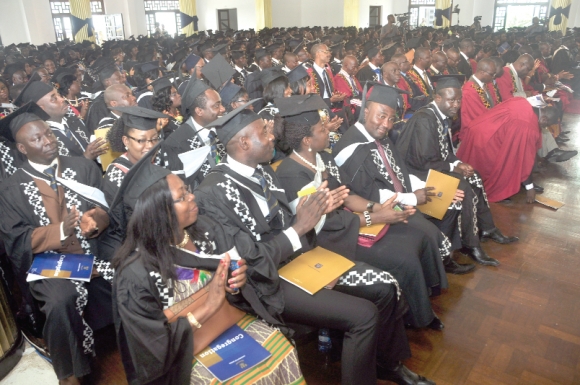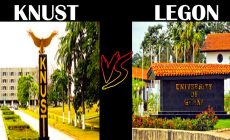Thousands of graduating students were told before the ceremony that there would be no handshakes as part of measures to prevent the possible outbreak of Ebola, the deadly virus that has killed more than 4000 people in Guinea, Liberia, Sierra Leone and Nigeria since February this year.
A number of the graduates who spoke to the Daily Graphic said although they considered the decision to be odd, the reason behind the move was in the interest of all.
In the absence of the handshakes, the male graduating students bowed, while their female counterparts simply paid courtesy by bending their knees.
The Director of Public Affairs of the university, Mrs Stella Amoa, first announced the decision, which attracted murmuring from the packed auditorium of the Great Hall, before it was emphasised by the Chairman of the university’s council, Prof. Justice Samuel K. Date-Bah, and the Vice-Chancellor, Prof. Ernest Aryeetey.
“The university has decided to conduct this ceremony in a responsible manner in order not to put each other at risk,” Justice Date-Bah, who is also a retired Supreme Court judge, said.
Conventionally, PhD graduates and First Class graduating students get handshakes from the academic dons and guest speakers at the ceremony, but it was not to be this year.
This year’s graduation was also different from previous ones where all schools and faculties had their graduation on the same day. Yesterday, the postgraduates were graduated first at a ceremony that ended before noon followed by the undergraduates and diplomates at 2.00 p.m. The previous system was notorious for causing long traffic jams and even telephone call congestions in Legon and its environs.
Number of graduating students
In all 4,172 students from 35 countries graduated. The graduates were made up of 1,278 postgraduate students and 2,894 students in other levels.
One hundred and thirteen students, representing 4.5 per cent of the graduating class, had First Class honours.
Ebola precautions in
University of Ghana
In his address, the vice chancellor explained that the decision not to shake hands with the students had become necessary to ensure there was the least contact to prevent possible Ebola spread.
He said beside the educational materials circulated on the university’s campuses, and the comprehensive information on the disease shared through emails and placed on the university website, a team led by the Director of Health Services of the university with representation from various departments and associations in the university was set up to lead the crusade against the disease in case of any outbreak of the disease.
“A facility has been prepared to initially contain suspected cases of Ebola. If positive cases are identified, transfer to the national treatment base will be arranged.
“As a precautionary measure, all members of the university community are required to complete an Ebola risk assessment form. Responses are being studied and requisite support and advice given,” he added.
In a report that covered a wide range of issues, including the university’s strategic plan, sports, research at the university and a proposed Legon City Project, Prof. Aryeetey said the premier university’s strategic plan covering 2014 to 2024 had been finalised.
The initiative, to be launched before the end of the year, has nine strategic priorities. They include asset management, research, teaching and learning, gender diversity, financial performance and monitoring and evaluation, all aimed at pushing the university to join the league of world-class research universities across the world.
Legon City Project
With a huge acres of its lands lying fallow, the university’s lands have over the years been constantly encroached on as growing demand for land in Accra increases as a result of urbanisation.
But Prof. Aryeetey said the university had found the antidote to threats of urbanisation posed to the university’s assets.











 (Selorm) |
(Selorm) |  (Nana Kwesi)
(Nana Kwesi)